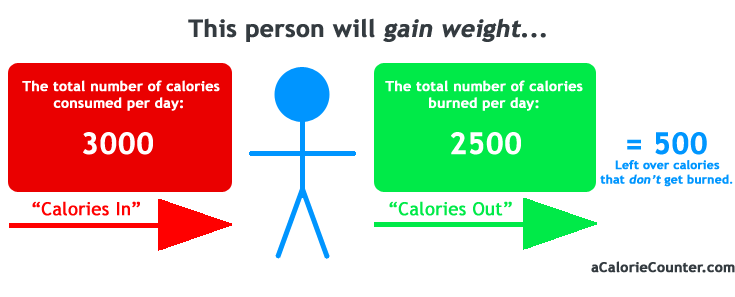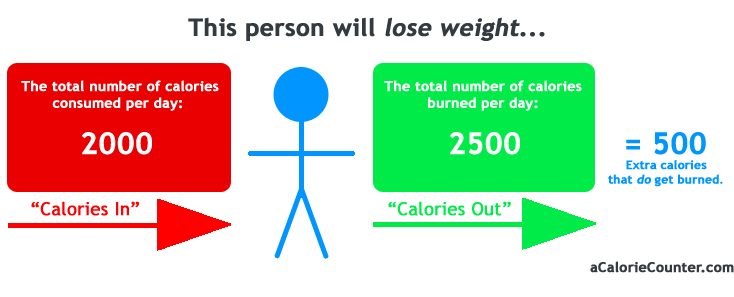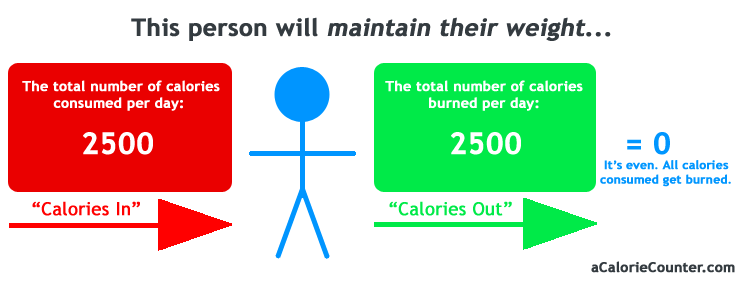Calories are everything..LET me REPEAT that...CALORIES ARE EVERYTHING!! Forget carbs, forget fat, forget protein, forget every single thing you ever heard about diet and nutrition. Weight control is all about calories.. NOTHING ELSE COMES CLOSE!!
 If a person takes in 3000calories per day, and uses 2500 calories per day by doing some simple math (3000 - 2500 = 500), there are 500 left over calories that are taken in but NOT used by the body. These excess calories are what causes weight gain.
If a person takes in 3000calories per day, and uses 2500 calories per day by doing some simple math (3000 - 2500 = 500), there are 500 left over calories that are taken in but NOT used by the body. These excess calories are what causes weight gain.


You can calculate your AMR by using your BMR and estimating your current level of activity. If you are:
Your AMR represents the number of calories you need to stay at your current weight. If you want to lose weight, you need to increase your level of physical activity level or decrease you r caloric intake by eating less.
If you reduce your current intake by 500 calories everyday, you will lose about a pound each week. BUT PLEASE DON'T GO BELOW than 1500 calories each day and DON'T waste time on CRASH DIETS!!
Everything you eat and drink contains calories.. From junk food like cookies, candy, potato chips and soda drinks, to more healthy food like whole wheat bread, grilled chicken, broccoli and orange juice....they ALL contain calories. Because there are the calories you are taking in, they are nicknamed 'calories in'.
Everything you do burns calories. Calories are energy, so they are used for everything your body has to do. From intense exercise like running and weight training, to everyday tasks like standing and tying your shoes... they all burn calories. And that's only the half of it. Your body actually uses a ton of calories every single day even when you aren't doing anything. Just keeping your body alive and functioning properly burns lots of calories. Because these are the calories your body is burning and using up, they are nicknamed 'calories out'.
Everything you do burns calories. Calories are energy, so they are used for everything your body has to do. From intense exercise like running and weight training, to everyday tasks like standing and tying your shoes... they all burn calories. And that's only the half of it. Your body actually uses a ton of calories every single day even when you aren't doing anything. Just keeping your body alive and functioning properly burns lots of calories. Because these are the calories your body is burning and using up, they are nicknamed 'calories out'.
Weight control is all about the battle between calories in and calories out. If they are both equal to each other, your weight will stay exactly the same. But, if one is higher than the other, your weight will change. Not only that, but it will continue to change in that same direction until they either equal each other, or they switch places and therefore cause your weight to change in the opposite direction.
This should help to give you a very clear picture of why calories counting is the key to weight control.
This should help to give you a very clear picture of why calories counting is the key to weight control.


A person will lose weight if they consume 2000 calories per day, and burn 2500. They are burning 500 more calories than they are consuming. This calorie deficit is what causes weight loss.

Last but not least, a person will maintain weight if they are consuming 2500 calories per day, and burning 2500. This means every calorie they consume is being burned. This is what causes a person's weight to stay exactly the same.
Your calorie requirements vary according to height, total body weight, ratio of fat to muscle, age, gender, genes, health and physical exercise. In general, your calorie needs can be reasonably accurately assessed base on two calorie components : Basal Metabolic Rate (BMR) and Physical Exercise.- Your Basal Metabolic Rate is the minimum number of calories needed to power your body while resting. i.e. energy needed by your body to maintain normal functions, like heart beat, respiration and normal body temperature. It accounts for about 60-70% of your calories requirements.
- The second major calorie component is physical exercise or activity. The more exercise you take, the more calories you burn.
English BMR Formula
- Women : BMR = 655 + (4.35 x weight in pounds) + (4.7 x height in inches) - (4.7 x age in years)
- Men : BMR = 66 + (6.23 x weight in pounds) + ( 12.7 x height in inches) - (6.8 x age in years)
Metric BMR Formula
- Women : BMR = 655 + (9.6 x weight in KG) + (1.8 x height in cm) - (4.7 x age in years)
- Men : BMR = 66 + (13.7 x weight in KG) + ( 5 x height in cm) - (6.8 x age in years)
- Sedentary (little or no exercise ) - your AMR = BMR x 1.2
- Lightly active (light exercise/work 1-3 days per week) - your AMR = BMR x 1.375
- Moderately active (moderate exercise/work 3-5 days per week) - your AMR =BMR x 1.55
- Very Active (hard exercise/work 6-7 days a week) - your AMR = BMR x 1.725
- extra Active (very hard exercise/work 6-7days a week) - your AMR = BMR x 1.9
If you reduce your current intake by 500 calories everyday, you will lose about a pound each week. BUT PLEASE DON'T GO BELOW than 1500 calories each day and DON'T waste time on CRASH DIETS!!
No comments:
Post a Comment